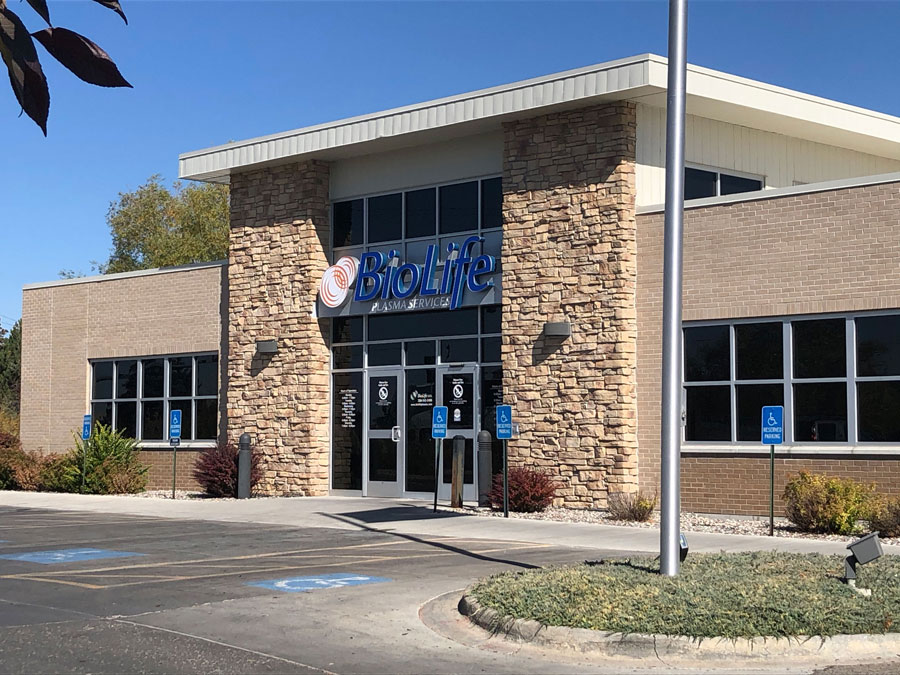Demand for plasma surges locally as race for COVID-19 vaccine continues
Published at | Updated atIDAHO FALLS – If you’re looking for a way to earn some extra cash during the COVID-19 pandemic, donating plasma is one option available to you.
Alicia Highlander, a spokeswoman for Biolife Plasma Services in Ammon, tells EastIdahoNews.com there is an urgent need for human plasma during the coronavirus outbreak.
“Plasma is used to make a wide variety of life-saving treatments that help thousands of people every day,” Highlander says. “Because plasma cannot be produced in a lab, those who rely on plasma-derived therapies are dependent on people regularly donating their plasma in order to receive continuous care.”
Plasma is a yellow liquid that is removed from your blood during the donation process and makes up 55% of human blood. It carries cells, proteins and other vital substances throughout the body, according to donatingplasma.org.
Plasma serves many functions, including fighting diseases. Highlander says it contains antibodies that are useful in treating people with COVID-19.
“BioLife is collecting a type of human plasma called convalescent plasma, which is derived from those who have fully recovered from COVID-19,” says Highlander. “With cases of COVID-19 continuing to rise worldwide, we … count on those who have fully recovered to help us develop a potential treatment for those most at risk.”

Those who are confirmed to have fully recovered from the virus and have been symptom-free for 14 days are eligible to donate. Biolife in Ammon is paying $200 per donation during the first two visits. Biomat USA in Rexburg and Pocatello is paying $100 per donation for as long as the antibody remains in your system.
“You have to come in twice before we can use the plasma in a medicine. We want to have two sets of test results” to compare so we can confirm the antibody is present, says Vlasta Hakes, a spokeswoman for Grifols, the parent company for Biomat USA.
For non-COVID patients, the compensation is staggered and changes monthly. This month, Biolife is offering $20 on your first visit. If you come back a second time in the same week, you’ll receive $50. It increases by $5 on the second visit of every week. Biomat starts at $25 and $30 during the first week and increases by $5 on each visit after that.
First-time donors at Biomat will be compensated $50 on their initial visit, then $75 and $100 on their second and third visits respectively.
The idea behind a staggered pay scale is to encourage people to keep coming back, Hakes says.
Those interested in donating must be at least 18, weigh at least 110 pounds and be evaluated by a doctor beforehand to ensure they are no longer contagious.
Donors are also required to pass a medical screening that tests for potential exposure to infectious diseases, use of certain drugs or medications and recent medical procedures.
“We recommend donors are well-rested, have a healthy meal beforehand and are well-hydrated,” says Hakes.
During the donation process, plasma is collected through an IV in the donor’s arm. A machine separates the plasma from the red blood cells and puts the blood back into the body.
“Donors are monitored throughout the process and receive intravenous saline or an electrolyte beverage following donation to replace their fluid volume,” says Highlander.
Exposure to needles, blood and bodily fluids is generally frowned upon during a health crisis, but Highlander says plasma collection has been identified by the U.S. Department of Homeland Security as a “critical service” and has a “special responsibility to remain open.”
“We have taken a number of extra precautionary measures to protect our employees and donors, including extra cleaning processes, social distancing practices, staggered working hours, appropriate personal protective equipment and associated training,” she says.
Temperature checks are performed on anyone who enters the building. Employees and donors are required to wear a mask.
The initial donation takes about two hours to complete. It takes about an hour for every visit after that.
“Donating plasma is a great way to give back and help make a difference in thousands of lives, whether it’s donating to help provide existing treatments or helping find a solution to COVID-19,” Hakes says. “We encourage everyone to consider being a donor. It’s a great way to relax in the middle of the day while helping others at the same time.”
To donate or learn more, call Biolife Plasma Services in Ammon at (208) 542-2406. You can also contact Biomat USA in Rexburg at (208) 359-1800 or in Pocatello at (208) 233-3888.
EastIdahoNews.com comment boards are a place for open, honest, and civil communication between readers regarding the news of the day and issues facing our communities. We encourage commenters to stay on topic, use positive and constructive language, and be empathetic to the feelings of other commenters. THINK BEFORE YOU POST. Click here for more details on our commenting rules.



